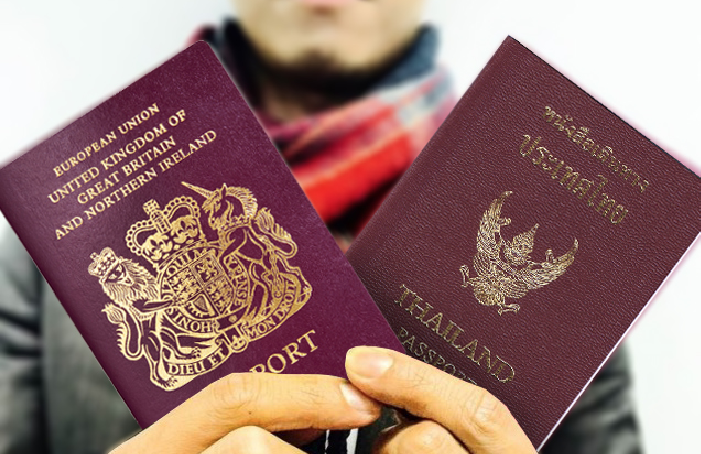Brits with Thai wives or husbands face cynical ruling that could split up families
| THOUSANDS of British expatriates married to Thai nationals face major financial hurdles if they return with their spouses to the UK. Supreme Court judges last month upheld a rule that forbids Brits bringing a foreign wife or husband into the UK unless the British citizen is earning at least £18,600 a year (or £22,400 if they have one child, then by an additional £2,400 for each subsequent child). The decision has been branded as cynical and discriminatory against the poor. Expats claim that the new rules make it very difficult to return to the UK – and suggest that they could lead to families breaking up, with one parent and children being left behind in Thailand. |
“This is a particularly tough rule for expats who have lived overseas for many years but want to go back home with their Thai spouses,” said a long-term British businessman at near-retirement age. “Finding a job in today’s economic climate in the UK is never going to be easy, especially for older people who are no longer in touch with the job market. How can they easily find work that pays £18,600, or even more if kids are involved?
“I can see them being forced to leave their families here in Thailand, and hope for the best.”
A growing number of expats on fixed income government pensions are being forced to consider their future in Thailand because of rising expenses. “But a move back to the UK is virtually impossible now,” said another Brit. “It looks like we have no choice but to stay here and see our standard of living decline.”
The judges said the government’s rules had the “legitimate” aim of ensuring couples “do not have recourse to benefits and have sufficient resources to play a full part in British life”.
However, they added that the rules did not take sufficient account of the welfare of the children involved, or of alternative sources of income, such as a home, savings or substantial financial support from family. Nor does it take into account the earnings of the overseas partner - even if he or she has higher qualifications, or are likely to be employed in higher-paid work than their British spouse.
The rule was introduced by the former coalition government to stop foreign spouses becoming reliant on taxpayers. It does not apply to wives or husbands from within the European Economic Area (EEA).
As a sop, however, the Home Office will henceforth need to make sure that each decision takes into account the rights of children - and whether a couple have other assets - perhaps a home, savings, or substantial financial support from family.
Criticism of the rule is widespread. The Spectator magazine said it “stinks of discrimination and injustice. It is hard to see how it is anything but a blatant breach of the right to a family life, enshrined within the European Convention on Human Rights. And yet the Supreme Court has upheld it.”
It goes on: “It is cynical and wrong to treat all British citizens who fall in love with a foreign national as if they were fraudsters and human traffickers. Splitting up genuine families in a futile effort to trim a few off the net migration figures is a horrible use of power.
“The income law ... is simply discrimination against the poor.”
“I can see them being forced to leave their families here in Thailand, and hope for the best.”
A growing number of expats on fixed income government pensions are being forced to consider their future in Thailand because of rising expenses. “But a move back to the UK is virtually impossible now,” said another Brit. “It looks like we have no choice but to stay here and see our standard of living decline.”
The judges said the government’s rules had the “legitimate” aim of ensuring couples “do not have recourse to benefits and have sufficient resources to play a full part in British life”.
However, they added that the rules did not take sufficient account of the welfare of the children involved, or of alternative sources of income, such as a home, savings or substantial financial support from family. Nor does it take into account the earnings of the overseas partner - even if he or she has higher qualifications, or are likely to be employed in higher-paid work than their British spouse.
The rule was introduced by the former coalition government to stop foreign spouses becoming reliant on taxpayers. It does not apply to wives or husbands from within the European Economic Area (EEA).
As a sop, however, the Home Office will henceforth need to make sure that each decision takes into account the rights of children - and whether a couple have other assets - perhaps a home, savings, or substantial financial support from family.
Criticism of the rule is widespread. The Spectator magazine said it “stinks of discrimination and injustice. It is hard to see how it is anything but a blatant breach of the right to a family life, enshrined within the European Convention on Human Rights. And yet the Supreme Court has upheld it.”
It goes on: “It is cynical and wrong to treat all British citizens who fall in love with a foreign national as if they were fraudsters and human traffickers. Splitting up genuine families in a futile effort to trim a few off the net migration figures is a horrible use of power.
“The income law ... is simply discrimination against the poor.”




















